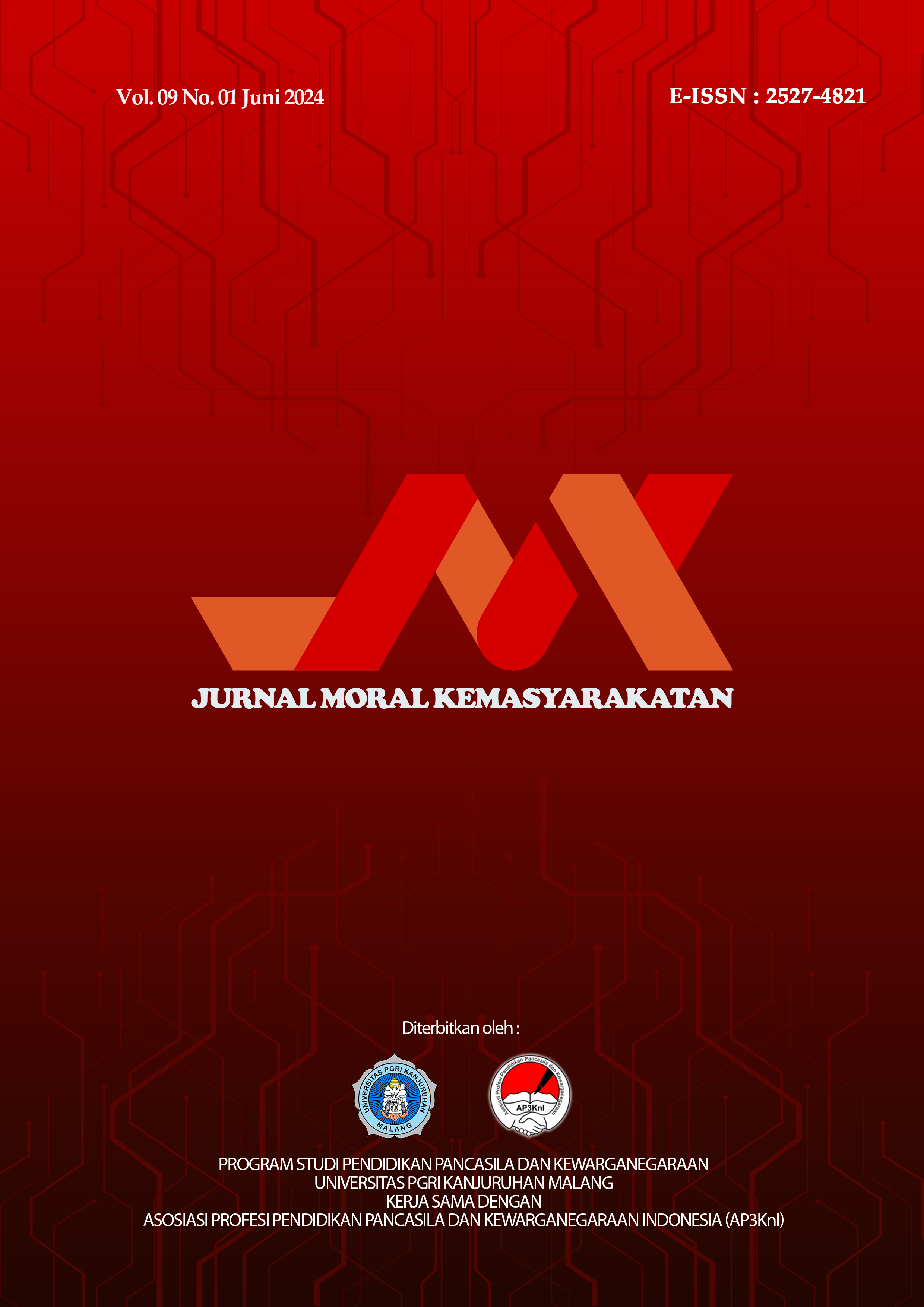Abstract
Dalam era globalisasi, kebinekaan menjadi isu yang mendesak di berbagai belahan dunia. Kebinekaan, mencakup keragaman etnis, budaya, agama, dan bahasa, memperkaya kehidupan sosial namun juga menimbulkan tantangan dalam menciptakan harmoni sosial. Pendidikan tinggi memainkan peran penting dalam membentuk pandangan dan sikap mahasiswa terhadap kebinekaan global. Di Indonesia, negara dengan kekayaan budaya yang kaya, kebinekaan global menjadi aspek yang unik, menyoroti tantangan masyarakat multikultural. Studi ini fokus pada persepsi mahasiswa Universitas Ahmad Dahlan terhadap kebinekaan global, mengidentifikasi faktor-faktor yang memengaruhi pandangan mereka. Metode survei digunakan untuk mengumpulkan data, dengan hasil menunjukkan bahwa mahasiswa mengakui pentingnya keberagaman global dan melihatnya dalam konteks kewarganegaraan. Mereka melihat penghormatan budaya dan musyawarah sebagai solusi untuk tantangan kebinekaan. Pengajaran yang tanggap budaya diperlukan dalam menanggapi keragaman etnis dan budaya di tingkat pendidikan tinggi, yang dapat meningkatkan prestasi siswa dan memperkuat keterhubungan global. Namun, tantangan dalam mengimplementasikan pendidikan kewarganegaraan global di Indonesia termasuk kurangnya keahlian guru, keterbatasan waktu dan anggaran, serta kurikulum yang padat. Penelitian ini memberikan wawasan tentang persepsi mahasiswa terhadap kebinekaan global dan menyarankan strategi pendidikan yang lebih responsif terhadap kebutuhan masyarakat yang semakin beragam.
References
Affandi, I., & Nu’man Somantri, M. (2020). Civic education, global Issues, and global Citizen. ACEC, 541–545. https://www.atlantis-press.com/proceedings/acec-19/125937472
Akıncı Vural, Z. B., Coşkun Değirmen, G., & Ünüvar, S. (2022). Social media as a dialogical communication tool: Izmir Metropolitan Municipality example. Online Journal of Communication and Media Technologies, 12(2), e202210. https://doi.org/10.30935/ojcmt/11557
Allan, A., & Charles, C. (2015). Preparing for life in the global village: Producing global citizen subjects in UK schools. Research Papers in Education, 30(1), 25–43. https://doi.org/10.1080/02671522.2013.851730
Aulia, S. S. (2016). Pembentukan wawasan global mahasiswa dalam mata kuliah pendidikan kewarganegaraan di FKIP Universitas Ahmad Dahlan. Jurnal Civics: Media Kajian Kewarganegaraan, 13(1), 66–81.
Aydin, H., & Cinkaya, M. (2018). Global citizenship education and diversity (GCEDS): A measure of students' attitudes related to social studies program in higher education. Journal for Multicultural Education, 12(3), 221–236. https://doi.org/10.1108/JME-05-2017-0030
Babacan, H. (2005). Challenges of Inclusion: Cultural Diversity, Citizenship and Engagement. Proceedings of International Conference on Engaging Communities, 1–18. https://researchonline.jcu.edu.au/17899/
Ballard, R. L., & Swenson-Lepper, T. (2023). Examining students' social media use and ethical awareness: Class activities and "Coastal Succulents." Communication Teacher, 37(3), 198–206. https://doi.org/10.1080/17404622.2022.2153891
Banks, J. A. (2004). Teaching for social justice, diversity, and citizenship in a global world. The Educational Forum, 68(4), 296–305. https://doi.org/10.1080/00131720408984645
Banks, J. A. (Ed.). (2009). The Routledge international companion to multicultural education. Routledge. https://doi.org/10.4324/9780203881514
Brooks, R., & Waters, J. (2015). The hidden internationalism of elite English schools. Sociology, 49(2), 212–228. https://doi.org/10.1177/0038038514525517
Castagno, A. E., & Brayboy, B. M. J. (2008). Culturally responsive schooling for indigenous routh: A review of the literature. Review of Educational Research, 78(4), 941–993. https://doi.org/10.3102/0034654308323036
Chang, M. J. (2002). The impact of an undergraduate diversity course requirement on students' racial views and attitudes. The Journal of General Education, 51(1), 21–42. https://doi.org/10.1353/jge.2002.0002
Creswell, J. W., & Creswell, J. D. (2023). Research design: Qualitative, quantitative, and mixed methods approaches (Sixth). SAGE.
Dyrness, A. (2021). Rethinking global citizenship education with/for transnational youth. Globalization, Societies and Education, 19(4), 443–455. https://doi.org/10.1080/14767724.2021.1897001
Education Above All. (2012). Education for global citizenship. In Childhood Education. Education Above Al.
Erel, U. (2012). Introduction: Transnational care in Europe--changing formations of citizenship, family, and generation. Social Politics: International Studies in Gender, State & Society, 19(1), 1–14. https://doi.org/10.1093/sp/jxs001
Gay, G. (2010). Culturally responsive teaching: Theory, research, and practice. Teachers College.
Gay, G. (2013). Teaching to and through cultural diversity. Curriculum Inquiry, 43(1), 48–70. https://doi.org/10.1111/curi.12002
Gay, G. (2015). The what, why, and how of culturally responsive teaching: international mandates, challenges, and opportunities. Multicultural Education Review, 7(3), 123–139. https://doi.org/10.1080/2005615X.2015.1072079
Goggin, P., & Waggoner, Z. (2005). Sustainable development: Thinking globally and acting locally in the writing classroom. Composition Studies, 33(2), 45–67.
Guérin, L. J. F., van der Ploeg, P. A., & Sins, P. H. M. (2013). Citizenship education: the feasibility of a participative approach. Educational Research, 55(4), 427–440. https://doi.org/10.1080/00131881.2013.844945
Howard-Hamilton, M. F., Cuyjet, M. J., & Cooper, D. L. (2023). Multiculturalism on campus. Routledge. https://doi.org/10.4324/9781003446101
Isman, A., & Gunggoren, O. C. (2014). Digital citizenship. TOJET: The Turkish Onlline Journal Od Education Technology, 13(1), 73–77.
Jooste, N., & Heleta, S. (2017). Global citizenship versus globally competent graduates. Journal of Studies in International Education, 21(1), 39–51. https://doi.org/10.1177/1028315316637341
Keating, A., Benton, T., & Kerr, D. (2012). Evaluating the impact of citizenship education in schools: What works and what are we measuring? In M. Print & D. Lange (Eds.), School, curriculum and civic education for building democratic citizens (pp. 57–72). Sense Publishers.
Kirkpatrick, A., & Liddicoat, A. J. (2019). The Routledge International Handbook of Language Education Policy in Asia (A. Kirkpatrick & A. J. Liddicoat, Eds.). Routledge. https://doi.org/10.4324/9781315666235
Lin, Y., & Kant, S. (2021). Using social media for citizen participation: Contexts, empowerment, and inclusion. Sustainability, 13(12), 6635. https://doi.org/10.3390/su13126635
Menthe, J. (2012). Education for democratic citizenship: Values Vs process. In M. Print & D. Lange (Eds.), School, curriculum and civic education for building democratic citizens (pp. 73–78). Sense Publisher.
Mossberger, K., Tolbert, C. J., & McNeal, R. S. (2008). Digital citizenship. The internet, society, and participation. The MIT Press.
Putriani, I., & Aras, M. (2022). Elevate company's social media as a diversity, equity, and inclusion platform: Multi cases study to digital technology companies. Journal of World Science, 1(10), 906–916. https://doi.org/10.58344/jws.v1i10.105
Sadiah, E., Yanti, P. G., & Tarmini, W. (2024). Global diversity values in Indonesia: An elementary school high-grade Indonesian language textbook analysis. Lnternational Electronic Journal of Elementary Education. https://doi.org/10.26822/iejee.2024.338
Veugelers, W. (2011). The moral and the political in global citizenship: appreciating differences in education. Globalization, Societies and Education, 9(3–4), 473–485. https://doi.org/10.1080/14767724.2011.605329
Zapata-Barrero, R. (2016). Diversity and cultural policy: cultural citizenship as a tool for inclusion. International Journal of Cultural Policy, 22(4), 534–552. https://doi.org/10.1080/10286632.2015.1015533
Jurnal Moral Kemasyarakatan memungkinkan pembaca untuk membaca, mengunduh, menyalin, mendistribusikan, mencetak, mencari, atau menautkan ke teks lengkap artikelnya dan memungkinkan pembaca menggunakannya untuk tujuan lain yang sah menurut hukum. Jurnal memegang hak cipta. Setelah artikel diterbitkan, hak cipta ditransfer dari penulis ke penerbit jurnal.

Karya ini dilisensikan di bawah Creative Commons Attribution-ShareAlike 4.0 International License .

